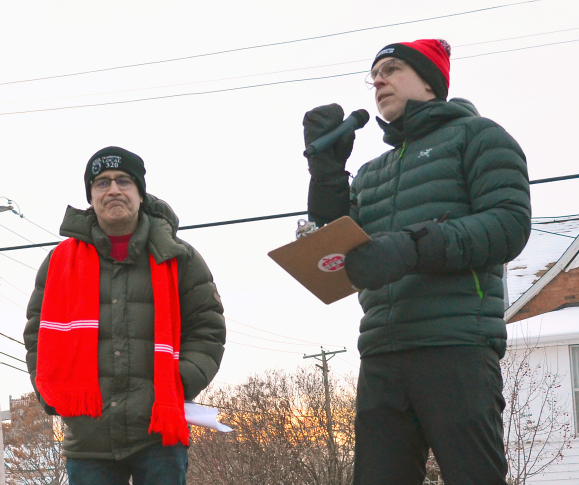
Dallas Robertson (L), a teaching assistant and member of Teamsters Local 320’s bargaining team, appeared with SPFE President Nick Faber at a rally outside the St. Paul schools’ district office last month.

Share
About 750 members of Teamsters Local 320 who work as teaching assistants in the St. Paul Public Schools will vote soon on a proposed two-year contract with the district. The sides finalized terms of a tentative agreement last Wednesday.
TAs targeted more access to professional development as their No. 1 priority in negotiations, and they refused to give up on the demand as bargaining dragged on for more than eight months.
Finally, the district agreed to language making professional development available to TAs whenever it closes school to offer trainings for its teachers. The current school calendar includes seven such days, Local 320 rep Josh Loahr said.
That’s a win not just for TAs, who assist early-education teachers and work individually with students who need extra help. It’s also a win for St. Paul students and the district as a whole.
“We want to learn how to serve our students better,” Dallas Robertson, a TA and member of Local 320’s bargaining team, said.
Previously, TAs had to seek out training opportunities on their own time, Robertson added, “even though we work with students all day, every school day.”
The district’s negotiations with Local 320 took place as the district also negotiated contracts with the St. Paul Federation of Educators, covering about 3,600 district employees. Both unions put student-centered proposals at the forefront of their contract campaigns, and they teamed up to turn out more than 100 supporters to a rally before a school board meeting last month.
SPFE remains without a tentative agreement, and the union has scheduled a strike vote Feb. 20.
Although Local 320’s last contract with the district raised the minimum wage for TAs to $15 an hour, they remain among the district’s lowest-paid employees. But the new contract, Loahr said, would give more TAs access to the trainings they need to climb into higher pay lanes.
“The real meat of our wage scale is based on career advancement,” Loahr said. “If TAs take professional-development courses, they can earn a lane advancement, which means more money. But because TAs have never been offered those courses, 46% of our (bargaining unit) is still at the first lane.”
The proposed contract would make it possible for a TA who takes advantage of every training day on the calendar to advance a full lane in just one year. That could translate into a wage premium of $1.50 to $3 per hour.
The proposed contract also includes wage increases of 1.5% retroactive to July 2019 and 2% in November 2020.
After a meeting Feb. 26 to review the contract, Local 320 members will take a ratification vote by mail. Ballots will be counted March 6.

